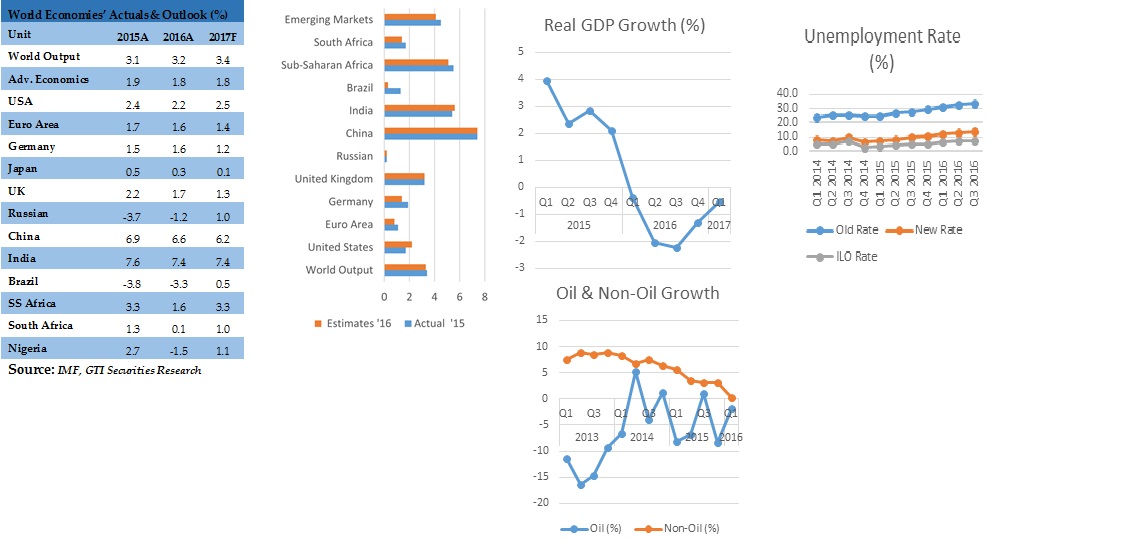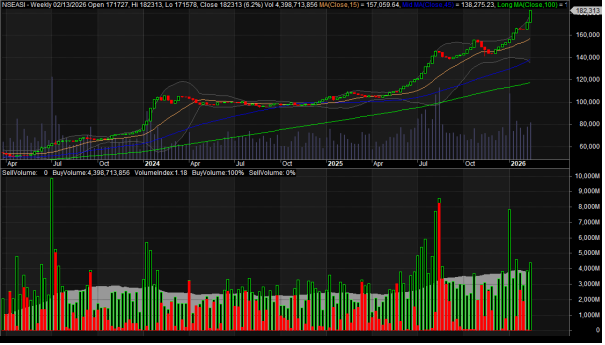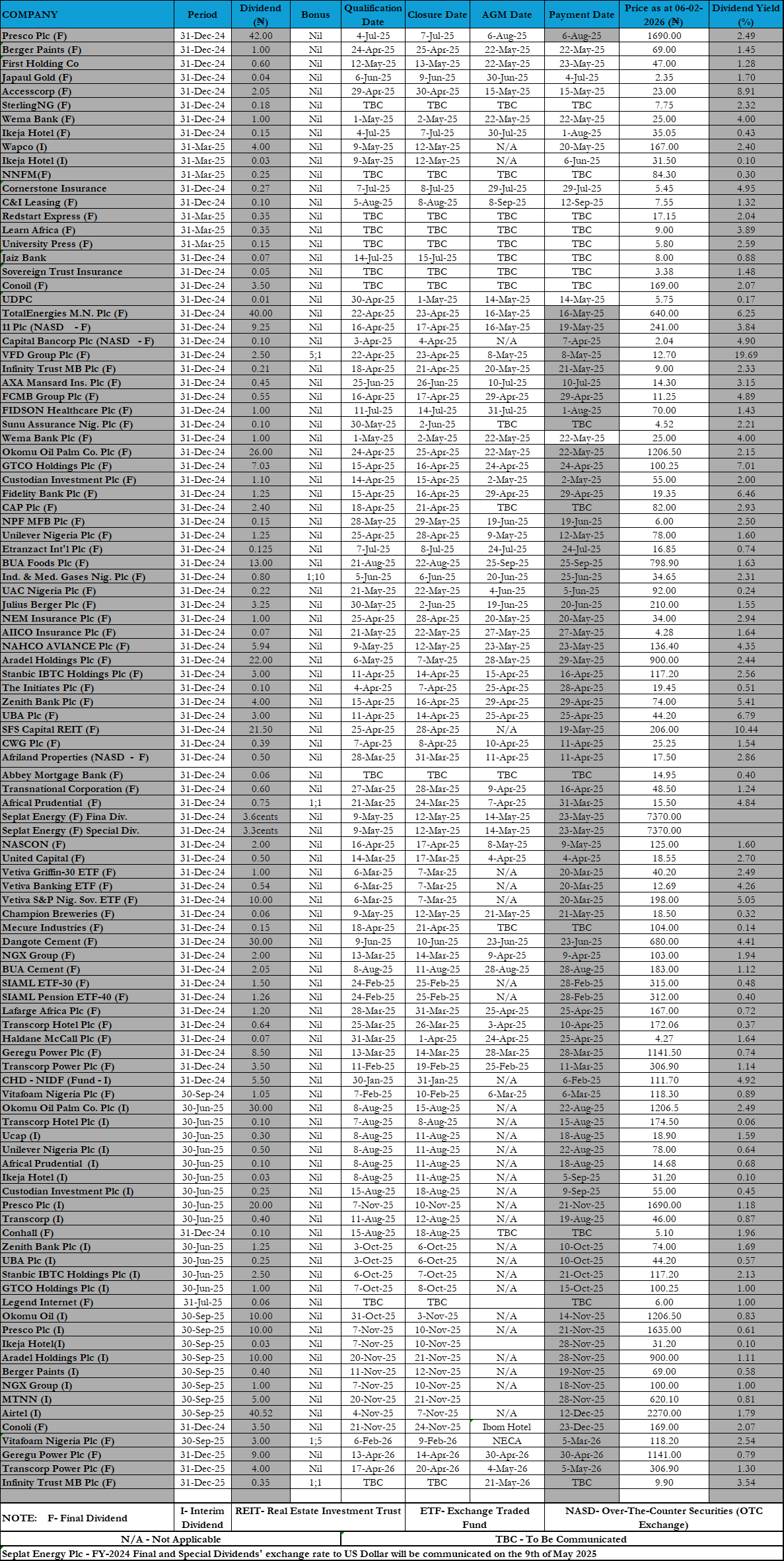
Global Economy Review: …
USA: The recent political utter-cations in the US has started exerting on the Country’s economy. In a recent release on the Country’s trade balance for the month of April 2017, deficit on goods and services widened to $47.6 billion against $45.6 billion gap reported a month earlier and higher than market expectations of a $46.1 billion shortfall. Analysis shows that exports to most countries fell by 0.3% to $190.98 billion, driven by lower sales of consumer goods and vehicles. Sensitive exports goods dropped values, such as consumer goods- -$0.7billion; artwork, antiques, stamps, and other collectibles- $0.4 billion; pharmaceutical preparations- $0.2 billion; automotive vehicles, parts, and engines- $0.5 billion and passenger cars- $ 0.3 billion. Conversely, imports rose by 0.8% to $238.6 billion, boosted by gains on consumer goods $1.9 billion; cell phones $1.8 billion; artwork, antiques, stamps, and other collectibles $ 0.5 billion and capital goods $0.9 billion. On an adjusted basis, exports went down to Canada -9%, Mexico -10.3$, the EU -10.6% and OPEC -12.1%.
Euro-Zone: Recently released data shows that the Eurozone economy has defied weak outlook at the start of 2017 and currently indicate signs of robust growth. Away from recent Q1 GDP growth of 0.5%, unemployment rate which is an indication of weak labour force declined to 9.3% in April 2017 from 9.4% recorded in the previous two months and below market expectations of 9.4%. This is the lowest jobless rate since March 2009. The common-currency bloc has managed to shake off earlier challenges, most notably a Brexit-induced slowdown that had been previously forecast for the region. The preliminary figures confirms that so far, the recovery has strengthened, with growth matching Q4 2016 figure.
China: The Chinese PMI remained stable in May at 51.2 points, same as was recorded in April, according to the National Bureau of Statistics (NBS) and the China Federation of Logistics and Purchasing (CFLP), which published the index. The reading was above the 51.0 points that market analysts had expected and stayed at the lowest level since October 2016. Nevertheless, the index rests comfortably above the 50.0 points threshold that separates expansion from contraction in the manufacturing sector. May’s reading reflected declines in production and the supply delivery time category, with both sub-components hitting a four-month low. All-important new orders steadied in May, while inventories and employment gained ground. Input prices; a reliable leading indicator for producer prices dipped below the 50.0 mark for the first time in over one year.
The latest Central Bank of Nigeria (CBN) data on Purchasing Managers’ Index (PMI), shows a positive development in the manufacturing sector of the economy for the second month in a row. The PMI reading for May stood at 52.5 index points compared to 51.1 recorded in April. Notably, the manufacturing sector has benefited from the recent CBN FX policy which has seen the Naira appreciated against the US Dollar by 46.6% from peak of N520.00 attained on 20th of February against current trading position.
The PMI is an indicator of the economic health of the manufacturing sector. It is based on weighted average of five major indices of manufacturing sector in the following categories: Production Levels, New Orders, Supplier Delivery Time, Employment Level and Raw Materials Inventory. A weight of 25%, 30%, 15%, 10% and 20% is assigned to each category respectively. A composite PMI reading above 50% indicates that the manufacturing economy is generally healthy and expanding, 50% indicates an equilibrium state, and below 50% indicates a deteriorating state.
The Nigerian manufacturing sector is classified into sixteen sub-sectors. Of this number, ten of the sixteen sub-sectors reported growth in the review month in the following order: primary metal; petroleum & coal products; plastics & rubber products; paper products; electrical equipment; appliances & components; textile, apparel, leather & footwear; cement; food, beverage & tobacco products and chemical & pharmaceutical products. Conversely, transportation equipment; nonmetallic mineral products; fabricated metal products; printing & related support activities; furniture & related products and computer & electronic products.
Breaking the PMI down, Production Level index accelerated up to third consecutive month at 58.7 points, up from 58.5 in April. The New Orders index increased to 50.5 points from 50.1 in the previous month. This was the second consecutive month uptrend. The Supplier Delivery Time index dropped to 49.9 points from April’s 47.5. The Employment Level index stood at 50.7 points against 46.6 recorded in previous month, indicating a growth in the index, the first time after twenty-six consecutive months of decline. Lastly, the Raw Material/Inventory index grew to 50.8 points against prior 50.6, representing a second consecutive months of uptrend.
Meanwhile, the composite PMI for the non-manufacturing sector grew to 52.7 points from 49.5 points recorded in April. This is the first growth witnessed in this session after sixteenth consecutive months of contraction. Of the eighteen non-manufacturing sub-sectors, 10 sub-sectors recorded growths, while the remaining eight sub-sectors reported decline in the review period.
We think the current manufacturing PMI statistics is encouraging and government.
 Foreign Exchange:
Foreign Exchange:
In the review period, the interbank exchange rate traded within marginal range of N305.40 and N305.50. The CBN was the major player as it continued with its intervention role in order to provide liquidity to the system. The Naira depreciated by 0.03% to close at N305.50 against the US Dollar. The Import and Export (I&E) FX window closed at N379.50, representing an appreciation of 0.25% over previous close. At the parallel market, the Naira also appreciated marginally by 1.83% to close at N375 against the Green-back. We will likely see lesser pressure on the Naira this week as the CBN continues to provide liquidity to the system.
Money Market:
Volatility on cost of funds decreased in the week. Using average NIBOR as our guide, it dropped to 12.05% from 14.11% recorded a week ago. OBB and Overnight rates also moderated to 8.33% and 9.08% respectively against previous week’s 11.67% and 12.42 as liquidity strengthened.
The Treasury bills market traded all through the week on a quite note and with mixed sentiments. The short end of the curve, predominantly June bills was the major focus to investors. Demand was also seen at the mid part of the curve, notably on November bills. Average yield on all maturities closed lower by 33 basis points when compared with last week’s close.
The CBN conducted series of OMO auctions during the course of the week to mop up excess liquidity and sold a total of N171.15billion. Also a total of N3.33 billion were auctioned for 190-day and 360-day bills at a stop rate of 18.00% and 18.60% respectively. We expect market to trade sideways as traders fix their eyes on this week auctions worth N73.6 billion.
Bond Market:
The fixed income traded on a mixed sentiments through the week as a good number of investors exited most mid and long positions as result improved activity in the equity space. There were no auction in the week, as such, the market was conservative as investors await the upcoming FGN Savings Bonds Offer for June 2017. Though, the Savings Bond offers lower yield but the shorter duration compared to conventional bonds makes it better attractive to retail investors. Week-on-week, average yield appreciated by 6 basis points. This week, we expect the market to trade sideways in anticipation of the outcome of third MPC meeting of the year.
Equity Market:
In the week under review, the equity market sustained prior week bullish rally to push uptrend to the second week in a row. As such, the NSE All-Share Index and Market Capitalization appreciated by 7.94% to close the week at 31,371.63 and N10.85 trillion respectively. Similarly, all other Indices finished higher during the week with the exception the NSE Oil/Gas Index that depreciated by 4.54% while the NSE ASeM Index closed flat.
Meanwhile, a total turnover of 2.32 billion shares worth N23.81 billion in 22,310 deals were traded this week by investors on the floor of the Exchange in contrast to a total of 1.88 billion shares valued at N20.06 billion that exchanged hands last week in 19,979 deals.
Sixty-one (61) equities appreciated in price during the week, higher than forty-four (44) equities of the previous week. Twelve (12) equities depreciated in price, lower than twenty-five (25) equities of the previous week, while one hundred (100) equities remained unchanged.
Equity Market Outlook: Week ending June 9th, 2017
The market in recent time has been driven by handful of positive economic data, better than expected Q1 corporate earnings and CBN FX restructuring on foreign investors. We expect a mixed market next week driven by periodic profit taking from traders as well as portfolio managers. Therefore, expect the market to trade sideways.
At this point, we strongly advise that investors take keen interest in equities’ fundamentals before taking an investment position. Ensure that you buy based on strong fundamentals. We equally advise taking a medium-long term view of the market. Note that a good number of stocks now trade at attractive positions (below/at fair value). For guidance, please refer to our GTI Top 5-Stock Picks.
DISCLOSURE
Conflict of Interest
GTI Securities Ltd and its sister companies within the GTI Group may execute transactions in securities of companies mentioned in this document and may also perform or seek to perform investment banking services for those companies mentioned herein. Trading desks may trade, or have traded, as principal on the basis of the research analyst(s) views and report(s).
Analyst Certification
Where applicable, the views expressed in this report accurately reflect the analysts’ views about any and all of the investments or issuers to which the report relates, and no part of the analysts’ compensation was, is, or will be, directly or indirectly, related to the specific recommendations, views or corporate finance transactions expressed in the report.
Disclaimer
This report by GTI Securities Ltd is for information purposes only. While opinions and estimates therein have been carefully prepared, the company and its employees do not guaranty the complete accuracy of the information contained herewith as information was also gathered from various sources believed to be reliable and accurate at the time of this report. We do not take responsibility therefore for any loss arising from the use of the information.
For enquires/research queries, please send an email to research@gti.com.ng













